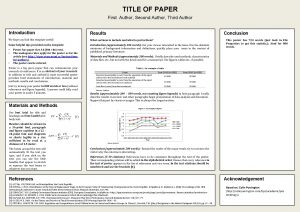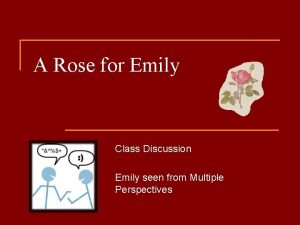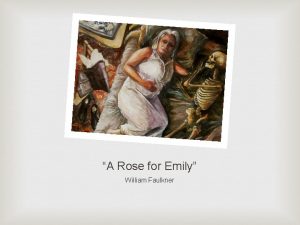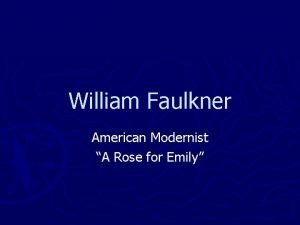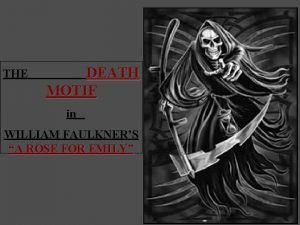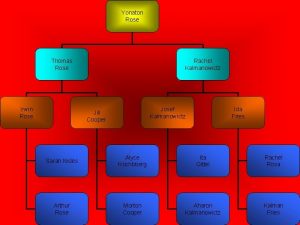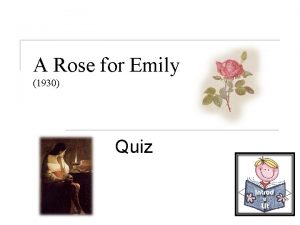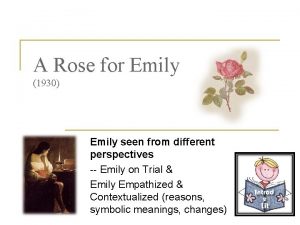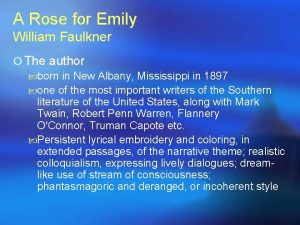A rose for Emily 20042819 Contents Author Southern








![Vocabulary & Expression • Eyesore among eyesore [119, P 3] Eyesore - [NOUN] You Vocabulary & Expression • Eyesore among eyesore [119, P 3] Eyesore - [NOUN] You](https://slidetodoc.com/presentation_image_h/85742877217380107a013c8a799c2c92/image-9.jpg)
![Vocabulary & Expression • Condolence [124, P 3] [NOUN] When you offer or express Vocabulary & Expression • Condolence [124, P 3] [NOUN] When you offer or express](https://slidetodoc.com/presentation_image_h/85742877217380107a013c8a799c2c92/image-10.jpg)
![Vocabulary & Expression • Circumvent [128, P 3] [VERB] If someone circumvents a rule Vocabulary & Expression • Circumvent [128, P 3] [VERB] If someone circumvents a rule](https://slidetodoc.com/presentation_image_h/85742877217380107a013c8a799c2c92/image-11.jpg)

- Slides: 12

A rose for Emily. 영어과 20042819 정난아

Contents • Author • Southern Gothic • Plot • Vocabulary & Expressions

• William Faulkner (September 25, 1897 – July 6, 1962) was a Nobel Prize-winning American author. One of the most influential writers of the 20 th century, his reputation is based on his novels, novellas and short stories. He was also a published poet and an occasional screenwriter. Most of Faulkner's works are set in his native state of Mississippi. While his work was published regularly starting in the mid 1920 s, Faulkner was relatively unknown before receiving the 1949 Nobel Prize in Literature. Since then, he has often been cited as one of the most important writers in the history of American literature.

Southern gothic • Southern Gothic is a subgenre of the gothic novel, unique to American literature. Like its parent genre, it relies on supernatural, ironic, or unusual events to guide the plot. Unlike its predecessor, it uses these tools not for the sake of suspense, but to explore social issues and reveal the cultural character of the American South.

Plot • "A Rose for Emily" is a five-part short story narrated by the townspeople of Jefferson, Mississippi, in the first-person plural perspective ("we"). The first section opens with a description of the Grierson house in Jefferson. The narrator mentions that over the years, Miss Emily Grierson's home has fallen into disrepair and become "an eyesore among eyesores. " The first sentence of the story sets the tone of how the citizens of Jefferson felt about Emily: "When Miss Emily Grierson died, our whole town went to the funeral: the men through a sort of respectful affection for a fallen monument, the women mostly out of curiosity to see the inside of her house, which no one save an old manservant – a combined gardener and cook – had seen in at least ten years. "

Plot • The narrator notes that on that date an engineer, Homer Barron, is seen in Jefferson with a crew of men to build sidewalks. After Emily and Homer are seen driving through town several times, Emily visits a druggist. There, she asks to purchase arsenic. The druggist asks what the arsenic is for since it was required of him to ask by law. Emily does not respond and coldly stares him down until he looks away and gives her the arsenic. When Emily opens the package, underneath the skull and bones sign is written, "For Rats. " Citizens of Jefferson believe that Miss Emily is going to commit suicide since Homer has not yet proposed in the beginning of section four.

Plot • The townspeople contact and invite Emily's two cousins to comfort her. Shortly after their arrival, Homer leaves and then returns after the cousins leave Jefferson. Upon his return, Homer is last seen entering Emily's home and then never seen again. After Homer’s disappearance, Emily begins to age, gain weight, and is rarely seen outside of her home. Eventually, Miss Emily passes away. The fifth and final section begins with Jefferson women entering the Grierson home. After they arrive, Emily's black servant leaves through the back door without saying a word. After Emily's funeral, the townspeople immediately go through her house. They come across a room on the second floor which no one had seen in 40 years, and break the door down.

Plot • They discover a dusty room strangely decorated as a bridal room. The room contains a man's tie, suit and shoes, and a silver toilet set which Miss Emily had purchased for Homer before his disappearance. Homer's remains lie on the bed, dressed in a nightshirt. Next to him is an impression of a head on a pillow where the townspeople find a single “long strand of iron-gray hair. ” It is thus implied that Emily had killed Homer and had lain in the bed with his corpse up to her own death.
![Vocabulary Expression Eyesore among eyesore 119 P 3 Eyesore NOUN You Vocabulary & Expression • Eyesore among eyesore [119, P 3] Eyesore - [NOUN] You](https://slidetodoc.com/presentation_image_h/85742877217380107a013c8a799c2c92/image-9.jpg)
Vocabulary & Expression • Eyesore among eyesore [119, P 3] Eyesore - [NOUN] You describe a building or place as an eyesore when it is extremely ugly and you dislike it. • Perpetuity[120, P 1] [Noun] If something is done in perpetuity, it is intended to last for ever. • Vanquish [122, P 2] [VERB] To vanquish someone means to defeat them completely in a battle or a competition.
![Vocabulary Expression Condolence 124 P 3 NOUN When you offer or express Vocabulary & Expression • Condolence [124, P 3] [NOUN] When you offer or express](https://slidetodoc.com/presentation_image_h/85742877217380107a013c8a799c2c92/image-10.jpg)
Vocabulary & Expression • Condolence [124, P 3] [NOUN] When you offer or express your condolences to someone, you express your sympathy for them because one of their friends or relatives has died recently. • Noblesse oblige [125, P 4] [NOUN] Noblesse oblige is the idea that people with advantages, for example those of a high social class, should help and do things for other people. • Cabal [128, P 3] [NOUN] If you refer to a group of politicians or other people as a cabal, you are criticizing them because they meet and decide things secretly.
![Vocabulary Expression Circumvent 128 P 3 VERB If someone circumvents a rule Vocabulary & Expression • Circumvent [128, P 3] [VERB] If someone circumvents a rule](https://slidetodoc.com/presentation_image_h/85742877217380107a013c8a799c2c92/image-11.jpg)
Vocabulary & Expression • Circumvent [128, P 3] [VERB] If someone circumvents a rule or restriction, they avoid having to obey the rule or restriction, in a clever and perhaps dishonest way. • Crescent [131, P 4] [NOUN] A crescent is a curved shape that is wider in the middle than at its ends, like the shape of the moon during its first and last quarters. • Inextricable [132, P 3] [ADJ] If there is an inextricable link between things, they cannot be considered separately

The End.
 First author second author third author
First author second author third author Climax in a rose for emily
Climax in a rose for emily A rose for emily plot diagram
A rose for emily plot diagram Exposition rising action climax falling action resolution
Exposition rising action climax falling action resolution A rose for emily climax
A rose for emily climax Genre of a rose for emily
Genre of a rose for emily A rose for emily discussion questions
A rose for emily discussion questions Roses for emily summary
Roses for emily summary Setting in a rose for emily
Setting in a rose for emily A rose for emily figurative language
A rose for emily figurative language Barn burning quiz
Barn burning quiz A rose for emily motifs
A rose for emily motifs A rose for emily vocabulary
A rose for emily vocabulary
